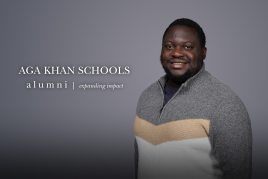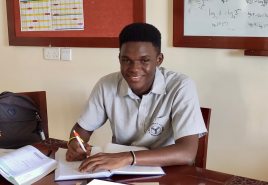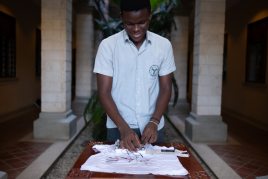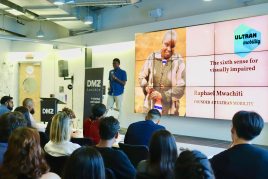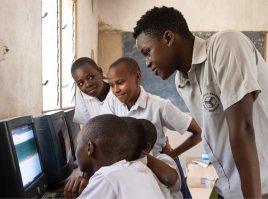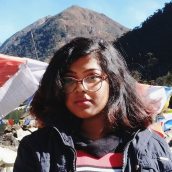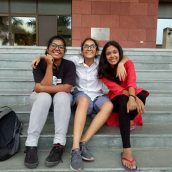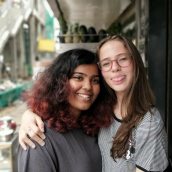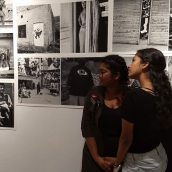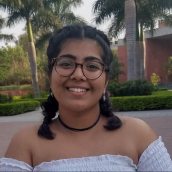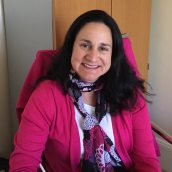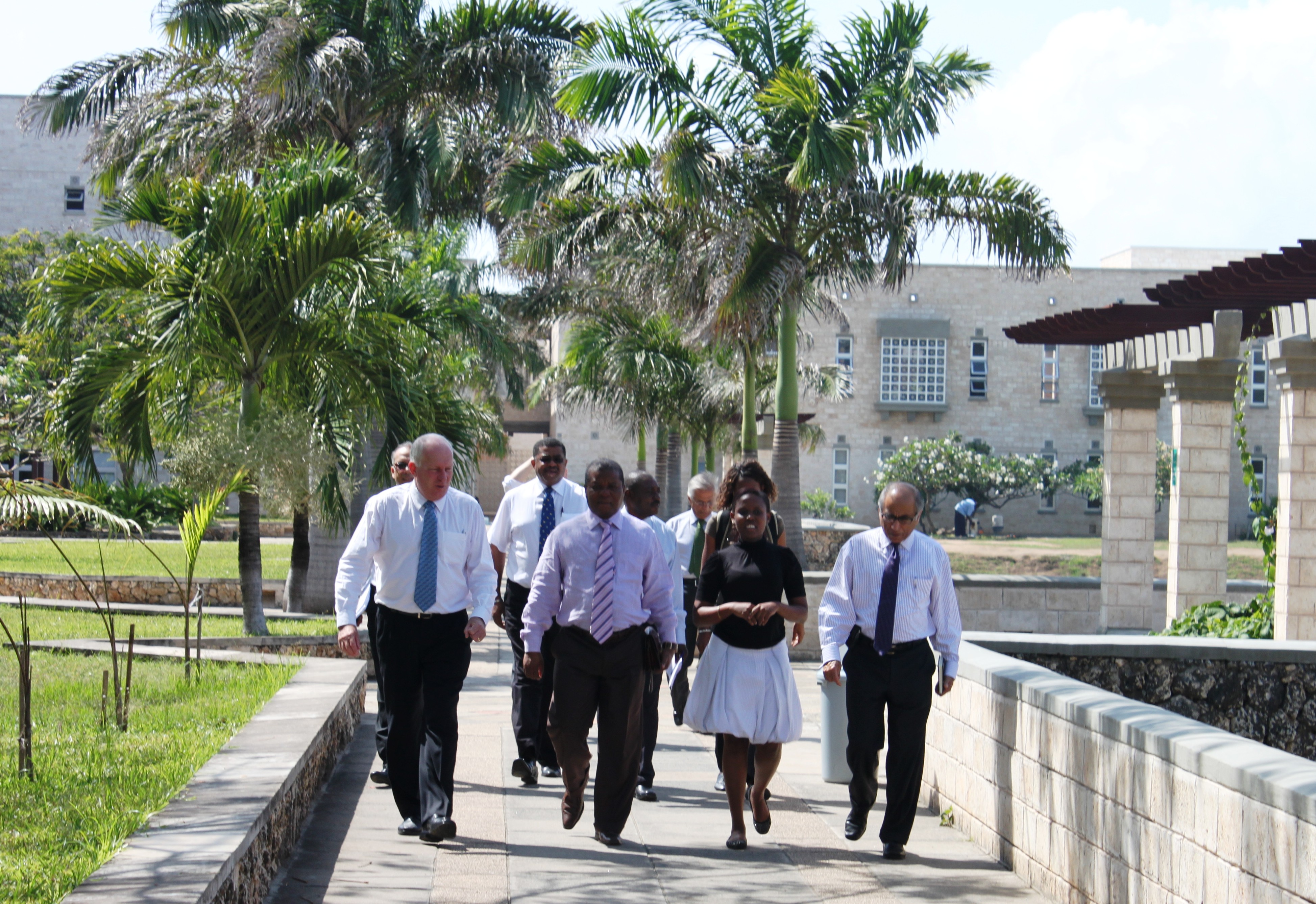Naheed Bardai's closing remarks at AKA, Mombasa's Class of 2015 graduation
The Cabinet Secretary of Education for Mombasa County, Mr. Tendai, Dr. Bentil, Mr. Bhatia, Mr. Otieno, Graduates, Parents, faculty and invited guests, thank you for taking the time to grace this occasion.
Dr. Bentil, thank you for your inspirational words and guidance, especially towards our graduates.
Joshua, thank you for your insights into the operations of our graduating class, including the things we didn’t – and I’m not sure I really wanted to know!
It is now my pleasure to present the The Aga Khan Academy Award of Excellence. The Aga Khan Academy Award of Excellence is given to the most outstanding male and female student in DP2 each year. This award is given to the top overall male and female contributors to academics and student life, and who best exhibit the AKA Learner Profile upon graduation in DP2. The award considers students’ achievements and contributions in DP1 and DP2. I will start with the female recipient.
Courageous, charismatic and pluralistic, the female recipient of the Award is a role model student. Academically, she is an inquirer with an insatiable thirst for knowledge. With a community-driven outlook and approach, she has managed to find the right balance in pursuing activities that benefit the community while also enabling her to grow. As an accomplished scientist, she earned a gold medal in an international science competition presenting her innovative low-cost water purifier that she carried through from her MYP Personal Project. As a celebrated artist, she has organized dance recitals and written and acted in her own play. Having recently suffered from a difficult illness prior to and during the examination session, she demonstrated the heart and resilience of a true leader. Next year, she will be pursuing her passion in Theatre at New York University in New York on a full tuition scholarship. Please join me in congratulating this year’s female recipient of the Aga Khan Academy Award of Excellence, Karishma Bhagani.
Passionate, socially conscious, and scholarly, the male recipient of the Award is one of the most inspiring students I have had the pleasure of working with. The owner of a true growth mindset, he is never satisfied with the status quo and is always looking to better himself in every way. His deeply held belief in equity and social justice manifest itself in all that he does. Coming from modest means and part of our Talent Identification programme, his humble and unassuming style makes him approachable and an inspiration to all, making us believe that one can overcome life’s obstacles. In many ways, this young man has been the maker of his own destiny. A dedicated researcher and scientist, this student completed his Extended Essay in World Studies looking at the relationship between agricultural productivity and household income in his local community. In addition, he placed third in an international science competition for his work in creating a generator that could produce 50 watts of clean energy using magnets. A former Student Representative Council executive member and current Dorm Captain, he has been a big brother to many. Receiving a full Mastercard Scholarship to study engineering at the University of Toronto, please join me in congratulating this year’s male recipient of the Aga Khan Academy Award of Excellence, Maxwin Ojwang.
Graduates, you have just conquered one of the most important rites of passage – sitting for two hours without sending a tweet, making a comment on Facebook or posting a picture on Instagram. Parents, this is clearly evidence that your sons and daughters are capable of unplugging while at home over their much deserved break. Graduates, you will soon have the chance to get caught up on all of your favourite series, play video games until your fingers fall off, and watch viral videos of strange animals doing strange things. You deserve this break, just as you deserve this ceremony in your honour. Just yesterday, these graduates surmounted a real milestone – their IB examinations. Graduates, I have seen you study harder than any other cohort I have known; I have seen you band together as colleagues and friends to support one-another in times of need; I have seen the joy on your face when you open that exam script and see the exact question you were hoping for; I have seen you curse those exact same exam papers; and as a class, I have seen you consume the most amount of coffee and sugar of any graduating class. Graduates, this is one of many rites of passage that you will undergo in your life. And as you go off to be a leading economist or entrepreneur who helps to find a way to bridge the poverty gap or solves Greece’s economic crisis, or that innovative scientist or engineer who finds a solution to our most pressing health or energy concerns, or that artist who helps us to reflect on our own identity, or that politician striving to create a more inclusive society – be humble and be brave. Be humble and be brave.
The greatest challenge that I believe you will face is not writing that university exam, getting that dream job, or finding a partner – the greatest challenge you will face will be challenges that test your moral compass – that test your integrity – that test your character. Will you have the capacity to forgive even when someone has let you down or stabbed you in the back? Can you have the patience and intellectual humility to invite multiple points of view, even if they disagree with your own? Will you be a good parent to your child? Will you be a good son or daughter to your parents?
To make matters even more complex in the challenges to your character is our ability to operate ‘in cognito’ online. We can do things through an email, text, tweet or photo that will self-destruct in 5 seconds that we would never dream of doing in person. While this relatively new way of relating to one-another has tremendous potential, we cannot hide behind the anonymity afforded to us so easily through technology, holding ourselves to different ethical standards.
That being said, if the last six years that I have had the privilege of working with many of you are anything to go by, I know that your moral compass is strong. Having spent a significant amount of time with all of you, I trust that the future of our communities and countries are in very capable hands.
Ladies and Gentlemen, these graduates are stars and are outstanding in so many ways. 9 of them helped to form our first Year 1 class in 2003, and many more have joined along the way. This cohort formed our first residential group in 2009, and marked the beginning of our robust Talent Identification and Financial Aid programmes. These graduates were the first to go through our mentorship and leadership programmes in 2011, and formed our largest ever Diploma class in 2013. Your combination of intellectual fervour, pursuit of social justice, excellence in athletics, creativity in the arts and inspirational leadership has left an undeniable mark on this school. Indeed, your success is all of our success, and other than your parents, there is nobody more proud of your accomplishments than your teachers. From the PYP to MYP and DP, these inspiring educators have helped to nurture your creativity, sharpen your critical thinking, develop your passions, and hone your moral compass. Graduates, please join me in thanking all of your teachers. I would like to thank all of those who have helped along the way – the nurses, kitchen staff, IT department, maintenance teams, drivers, admin staff and librarians. Without you, none of this would be possible.
To conclude, I would like to quote His Highness The Aga Khan from a recent speech he made in Nairobi at the Aga Khan University graduation. He said, “This is not a Farewell Ceremony. In fact, an event like this is often called a “Commencement”, since it marks the beginning of so many great new stories. We hope that you too will share your stories with us, in the days ahead.” On that same note, I would like to acknowledge and thank our many alumni who have joined us today for this ceremony.
Once again graduates, we wish you well and congratulations. Thank you.
“Creating leaders”: Impact of an Aga Khan Schools education
During his time at the Aga Khan Academy Mombasa, Ham Serunjogi (Class of 2012) – CEO and co-founder of African fintech giant Chipper Cash – realised the importance of staying connected to something larger than himself and giving back to the world. This fuelled his remarkable success, and recently, the Forbes 30 Under 30 honouree was selected to serve as an advisor to the US President on African diaspora engagement.
“A big part of it was that I was in the residential programme,” Ham says. “My roommates and my house parents were a central part of my experience; they practically became family to me.”Originally from Uganda, Ham became a part of the Academy’s residential programme, where students in Grades 6-12 from around the world live on campus and participate in different activities and leadership opportunities.
“The group of friends I had on the floor we lived on,” he continues, “I value those friendships deeply.”
Ham credits his dorm parent, Mr Bardai, as a large part of his amazing experience at the Academy.
“Mr Bardai was absolutely the best and looked out for me,” he said. “We remain close to this day.”
Along with his residential parents, Ham fondly recalls teachers such as Mr Kassam, who incorporated meals in his English lessons as they were described in books the students read in class, which encouraged the kids to bring in their own dishes for a potluck.
“We had a really fun time in class with Mr Kassam.”
Ham also recollects his role as President of the Academy’s Student Representative Council, which allowed him to lead the secondary school students and work closely with his peers and teachers.
“The Academies as a whole aim to instil in their education the notion of creating people who are leaders that can come back and help develop their local communities,” he explains. “The idea of being a net positive contributor to society – that was something I learnt strongly.”
“The more I think back on the ways the Academy made sure we were connected to the community, with the events we did outside of the Academy with other community members, that was a key reminder to not stay in an isolated group of privileged people or with people that aren’t connected to something larger than ourselves,” he explains.
“That really resonated with my time over there.”
From Kampala to Mombasa to Iowa
After completing the International Baccalaureate (IB) Diploma Programme at the Academy, Ham’s journey leaped to another continent when he moved to Iowa in the US to study economics at the prestigious Grinnell College.
He was ready for the adventure, thanking his move to the Academy in Mombasa from his hometown in Kampala, Uganda as an insight into what it is like to move away.
“[My time at the Academy] was the first time in my life I lived away from home,” he says. “It was like a nice trial period before moving further away.”
“I was excited to move to Grinnell, to Iowa, for all the big and small things like seeing snow for the first time,” he reflects. “Just being around a new environment, new culture and a new group of people was very exciting.”
The creation of Chipper Cash
Following his graduation from Grinnell and a two-year stint at Meta (formerly Facebook) came a pivotal stage in Ham’s life. In 2018, he and his co-founder Maijid Moujaled established Chipper Cash, a financial technology, or fintech, company offering several products and services to people in Africa, such as local and cross-border payments, cards, stocks, airtime and data, and bill pay.
“I wanted to make an impact on my local community with what I know best,” Ham says. “I wanted to create a solution that might solve a problem for people in Uganda.”
The CEO met his co-founder at Grinnell, who wanted to create a similar solution for the people of Ghana, where he was originally from.
“It was easy to align our thinking because we wanted to start the company to check some boxes – what needs to be done and where?”
Chipper Cash now has over five million customers operating in countries including Nigeria, Rwanda, Ghana, Uganda and the US. It has been featured in several global financial publications as well as news channels including BBC, CNN, Quartz, Apple and Forbes, in which Ham was named as one of the honourees of the Forbes 30 Under 30 Finance List of 2023.
Serving on the US President’s advisory council
In September 2023, Ham was appointed to serve on the Inaugural President’s Advisory Council on African Diaspora Engagement in the United States. The Advisory Council is tasked to advise the US President on a range of issues, including how to strengthen relations between Africa and the US, promote trade and investment, and build educational exchanges.
“I definitely pinch myself every night just to make sure I’m not dreaming,” he laughs. “If you’d ask me at any point in my life if I would ever be an advisor to the US President, there’s no way I’d have thought that’s possible.”
Ham highlights what he is most excited about for his role as an advisor.
“One, it’s an incredible group of people to be a part of,” he says. “And two, in today’s world, Africa is the fastest growing continent and they’re strong partners with the US. We will help advise the President to form policy and help drive US-African relations and investment further.”
“Policy is going to affect billions of people, and if we do our job well, we’ll make a positive impact on the world. If that’s all I ever do in my life, I’ll be very happy with myself.”
Giving back to the Academy
Ham feels fortunate to be in a position where he can give back to the place that started it all. The alumnus consistently provides the Academy in Mombasa with support by coming back to address graduates, creating videos and content to promote the Academy, or even donating to support current and future students.
“It’s a special place to me,” Ham describes. “I was fortunate enough to give the 2021 graduation commencement address, and the theme of my remarks was the realisation of the opportunities I’ve been lucky to receive, and the best way to repay them is to help repair the world.”
Raphael Mwachiti: Using technology to advance the community
When Raphael Mwachiti, a Diploma Programme (DP) student, got admitted to the Aga Khan Academy Mombasa on a fully funded scholarship through the Talent Identification Programme (TID) in 2015, he knew it was a life-changing opportunity.
“I was thrilled and filled with joy that I got to see my parents be proud of me for getting the admission but I also understood that it was now up to me to make use of the resources and support from the Academy to make something of myself,” Raphael says.
After five years at the Academy, he says his experience feels like a great adventure, one he had never thought of undertaking.
“I got to see different perspectives and meet people from different backgrounds,” Raphael says. “I’ve also been able to go to new places like Canada and Tanzania and learn many new things.”
Although he hit many bumps along the road, he says they’ve helped him grow as an individual and have given him a glimpse of the world to better prepare him to be an active member of his community.
Raphael has not only had outstanding achievements in the classroom but has applied what he’s learnt to effect change outside the classroom. He has embraced the ethos of the Academy by striving to improve the lives of others.
In 2019 he won the Ryerson Sandbox Basecamp prize for his innovation to aid the visually impaired. He was awarded a grant of $5,000 CAD and specialist professional advice to help advance his start-up. He is now working to produce these devices for further testing with the hope of impacting more than 250,000 visually impaired persons in Kenya.Additionally, Raphael helps farmers in his rural home of Kinango learn new farming techniques like greenhouse irrigation and composting, which are now being utilised to help increase harvest in all seasons thus increasing sustainability within the community. He also teaches computer skills to kids in his old school, which has evoked an interest in technology within them.
"I first met Raphael when we were doing the Talent Identification testing in October 2014,” says Dean of Admissions Paul Davis. “We sat outside one of the classrooms at St. Joseph's Primary School in Kinango. The first thing I remember asking him was whether he was emulating the great Italian artist. He mentioned that the name came from his dad, who was an artist and painted local wildlife and scenes to sell to the tourists in his shop in Ukunda."
"What I admired about Raphael at that time as well as his intellectual capacity was his honesty," said Paul. "He said that the most difficult moment he had to deal with was when he saw a child selling charcoal in Kinango and not going to school; he had reported it and the child was given free education. In a personal story he had written he mentioned a story about rescuing a child from a house on fire - when I asked about this and whether this had really happened, he admitted that it was not true and he had been told to write this by his teacher - he said he knew at the time that he should not be writing this and felt uncomfortable doing so. I had a feeling then that if we chose him he was going to be a self-driven and principled leader. I am pleased to see that these initial feelings were correct and he has turned into a fine ambassador for the Academy".
After being at the Academy for the last five years, Raphael now feels an even stronger responsibility to give back to his community and society at large. “With this understanding, I believe that the next wave of leaders coming from the Academy will be the foundation of positive change in the world,” says Raphael.
Watch Raphael's story, which is featured on the Aga Khan Development Network:
Jemin Patel (Class of 2018): A journey of hard work, passion and striving for excellence
Jemin Patel’s journey to where he is now is the result of hard work and passion, values he picked up during his time at the Aga Khan Academy Hyderabad. Yet his story started sometime before this, when he was selected to attend the large, 100-acre Academy through a full scholarship.
Starting in the Academy as a Grade 8 student, Jemin felt all the nervousness of moving to a new place and starting at a new school. He felt out of place, not knowing whether he would succeed. Although he knew this would be difficult, he embraced the notion of working hard, instead of working smarter.
“I’ve learnt that hard work always wins,” he said. “People say, ‘work smart, not hard’. I could not disagree more. Working smart makes you efficient, whereas working hard with a focused mindset makes you a high performer.”
Although it has been five years since he graduated, Jemin continues to visit the Academy to coach and interact with students. He expressed how he felt like a big brother passing on the torch and imparting wisdom he would have loved to have during his time at the Academy. During his most recent visit, Jemin met the founder of the newly formed SAGE (Sexuality and Gender Expression) club at the Academy and felt so proud of the students.
Now, working at one of Canada’s top accounting and consulting firms, Ernst & Young, specialising in audit and assurance services, Jemin still stands by the notion, “hard work always wins.”
“It’s not about perfection, it’s about striving for excellence,” he said. “Putting in a focused and genuine effort into everything you do is all that matters.”
Interview conducted by DP2 student Samhitha Paruchuri from the Aga Khan Academy Hyderabad.
Eshwari Ramsali (Class of 2018) - fusing art and ideology
“Honestly, it still hasn’t hit me that I get to go to the college of my dreams,” she said. “It’s so surreal.”
Two years ago Eshwari wrote an entrance assessment test at the Aga Khan Academy Hyderabad but was not sure if she would be able to join.
“I was dismayed because I loved the concept of an IB education,” she said. “The Academy made it possible for me to be here.”
Eshwari joined the Academy in 2016 and used every opportunity to learn and to express herself, diving into visual arts and global politics courses. She attributes a lot of her personal and intellectual growth to the discussions she had in her Theory of Knowledge (ToK) class.
“It upsets me that I will never have another ToK class,” she mused.
After her creativity, activity, service (CAS) summer internship in Dehradun, Uttarakhand, Eshwari stayed on to do an internship at a film production house, working in production and postproduction on documentary films.
“I like to call it the summer I became a feminist,” she said. “Feminism, for me is a social movement whose success lies in providing equal opportunities for all sexes and genders.”
For Eshwari, it is natural for film and feminism to go together. She describes art and politics as her academic crushes and appreciates the IB for having the accoutrements that allow for interdisciplinary approach to learning. Her extended essay combined visual arts and global politics to write a compelling piece on freedom of expression and art activism. Eshwari’s display at the 2018 Diploma Programme Visual Arts Exhibition also espoused the mingling of subjects, presenting work with powerful feminist overtones.
“Eshwari has exemplary artistic calibre,” said Senior School art teacher, Vijayraghavan Srinivasan. “She has a meta-narrative quality in her pictorial composition which captures recollecting past memories and incidents, fusing them with self-discovery."
The DP Visual Arts Exhibition is a red letter day for Senior students and they work long hours to see it come to life.
“Personally explaining my art and concepts to viewers and seeing realisation dawn on their faces was incredibly rewarding,” Eshwari said. “The exhibition was so important for so many different reasons, and being a part of it with some of the most talented students of the Academy made me happy.”
Eshwari remembers not being confident about her decision to join the arts programme at the Academy, but she’s pleased that she did. Through the programme, Eshwari got to work with professional artists and sculptors, and also discovered artists and filmmakers whose work inspires her and helps her identify herself. Vijayraghavan describes her artwork as insightful and contemplative, and also explorative.
Though she is an exceptional artist, Eshwari wants to study political science so she can pursue a career as a humanitarian lawyer or work in development. She intends on taking courses in art history, so that she can seamlessly step back into the art world, should the opportunity arise.
“The idea of being intellectually stimulated even well into my 50s really excites me.”
Somewhere between learning about the IB and her last ToK class, Eshwari fell in love with the Academy.
“I love that my classes are filled with students from all parts of the country,” she said, “irrespective of their financial standing or cultural background. I strongly believe it helps build our vision of pluralism.”
We wish her and all the rest of the Class of 2018 the best of luck in all their future endeavors!
Theresa Urist: A passion for education
An Interview with Theresa Urist, Global Director of University Counselling at the Aga Khan Academies
Theresa Urist has always loved to learn. Growing up in a rural community in New York state, where many of her classmates did not go on to college, her thirst for education led her to Stanford, where she earned a B.A. with Honours in American Studies and tutored high school students in her spare time. She realised that she loved teaching as much as she loved to learn, so she secured a spot in the Master of Education programme at Harvard University before becoming a high school teacher and, later, a university counsellor.After more than two decades as a counsellor in the United States, where she directed college counselling at three different schools, Theresa’s desire to support students from poor communities led her to the Aga Khan Academies, where she became the Global Director of University Counselling in 2015. Her role is essential to the mission of the Academies, which aim to produce effective, ethical leaders with the skills and knowledge to support positive development in their societies. As the networks’ university expert, she coordinates the university counselling process so that the students are admitted to and select universities where they will flourish in their chosen fields.
Aga Khan Academies writer Alia Dharssi sat down for a conversation with Theresa about her passion for education, her work at the Academies and what makes her tick. Their conversation has been edited for clarity and length.
Alia: Can you tell me about yourself and how you wound up becoming a university counsellor?
Theresa: I was born and raised in a very small town on Long Island in New York State. I wanted to be a journalist as a kid and wound up writing for my college daily newspaper, where I had a 1am news deadline. It was crazy and frenetic. I realised that’s not what I wanted to do, but I had also begun tutoring at a nearby school and I really, really loved working with the students. That experience put me in the direction of education. I earned a Masters of Education from Harvard and became an English and history teacher. In 1995, I answered the call to become an interviewer for Harvard undergraduate admissions. I loved talking to students about their future plans and goals during the interviews, so I put the pieces together and entered the field of university counselling.
Alia: What makes you passionate about education?
Theresa: The way I see it, education is the key to social mobility. When students – like the ones on full financial aid at the Academies who are selected through our talent identification programme – become educated, it’s something that doesn’t just benefit them. It benefits their family and their community and has a ripple effect. I see it as a way that entire communities can get themselves out of poverty in one generation. Education is the most concentrated way you can effect lasting social change. That’s what gets me up in the morning every single day to do the work that I do.
Alia: Have you always thought about education in this way?
Theresa: Education is always something that has been at the forefront of my mind. My parents were well educated, but I grew up in a very rural community where a lot of people had not studied beyond the secondary level. So, when I went off to university at Stanford 3,000 miles away from home, it was an eye-opening experience. I was surrounded by very motivated people with a lot of interesting ideas. I had been a big fish in a little pond in my secondary school because I was somebody who was very hungry for education. I tried to access a lot of educational opportunities despite the fact that I attended a regional, rural public high school that did not offer the most enriching academic experience. College was the first time in my life I was surrounded by students who had had very different life experiences, who had gone to schools that were very academically rigorous, who were incredibly curious. It was vibrant and transformative.
Alia: That sounds like an amazing experience. You started working at the Academies after two decades of working as a counsellor in the US. What inspired you to take the job?
Theresa: When I heard about the job, it seemed like a perfect fusion of my interests. The mission of the Academies in terms of providing educational opportunities for students regardless of their means is one that spoke to my heart. In two decades of counselling, I had gone from working in college prep, private schools to working at an urban public school with very low-income students. There are so many talented kids whose socioeconomic background prevents them from accessing very good academic opportunities in places where they’re going to flourish. And so, in my own job search, I was looking for an organisation that provided such opportunities for students in need. I was also interested in international education – in addition to being a US citizen, I’m also a Swiss citizen and I’ve spent a good amount of time overseas – so this position really spoke to me.
Alia: What kinds of struggles have you seen students from poor socioeconomic backgrounds face when it comes to getting a good education?
Theresa: In my last role in the US, I was working in an urban public charter school with low-income students from all over the world. The majority of my students were first generation, meaning their parents had immigrated to the US. They did not speak English at home and they would be the first in their families to access higher education. I helped them navigate the system. Many of their families came from countries where poverty was a problem. Just getting to the US was a big hurdle. In addition, education is very, very expensive in the US, so it was a challenge for those students to figure out how to finance their education.
Alia: That sounds quite different from your role at the Academy. How do the two experiences compare?
Theresa: I certainly have a lengthy background in university counselling, but when I was based in one single school, it was quite limiting in a lot of ways. My work at the Academies requires a much larger scope in terms of finding what universities are a best fit for particular students. I had good working knowledge of US and Canadian schools coming in. What’s newer for me is some of the other schools beyond that, particularly schools in the UK. It’s given me a greater global perspective on education in terms of the different programmes that exist and the ways in which universities are trying to position themselves globally.
Alia: Can you tell me about your trips to the Academies? What was your first impression?
Theresa: My first visit was to Hyderabad. I found the students compelling and the facilities stunning. Everything exists in the service of students and forwarding their academic and personal growth. When I first made a visit to the Mombasa school, I found the level of arts that students were doing and the level of introspection that went into what they were creating was incredibly deep and heartfelt. It was more advanced than what I’d seen at other schools. A lot of the students’ art projects dealt with issues of social justice and presented very clear messages that made me hopeful. Seeing that level of attention given to something that is often peripheral at other schools speaks volumes about the Academies.
Alia: Absolutely. Why is your role important to the Academies’ vision?
Theresa: As we grow as a network, we want to make sure we are offering a consistent quality of university counselling services across campuses, so that’s a really important part of my work. We want colleges and universities across the globe to know who we are and why they should admit our students and fund them, so a big part of my job is conducting outreach to universities and colleges. When a university takes a risk on a student and that student does well, then it knows that it has a viable academic candidate and will admit more and more students from our schools. My job is to try to create pipelines for students at academically rigorous universities that recognise who we are and why our students are so interesting and compelling.
I also conduct some professional development like workshops for faculty members where they receive training about best practices for writing recommendations for students. Both campuses are now on the Naviance platform, which is an online portal that allows students to track all their applications and send documents to universities electronically. We also track data on the admissions process on the platform.
Alia: That’s important work, but now for a less serious question. What do you do when you’re not busy counselling?
Theresa: I love to cook and bake. In particular, I like making fancy cakes and tortes. Every year, during the holidays, I create a gingerbread house. They’re not basic ones; I have architectural plans. Last year, I made a church with candy stained glass windows. The year before, it was a Victorian house. Every year I do a different structure.
Alia: That’s quite a hobby. Do you eat the houses?
Theresa: Yes, eventually I do. My friend’s kids help me decorate the house, it stays up and then it gets destroyed. So that’s one of my hobbies. To balance my baking interests, I was a distance runner and had run a bunch of marathons, but I had to stop after an injury. But I still really like to be active. I like hiking and skiing and being outside.
Alia: Is there anything else you’d like to say?
Theresa: I love the work I do. I feel like mine is a really important role, so I’m just very grateful for the opportunity to work on behalf of the Academies.
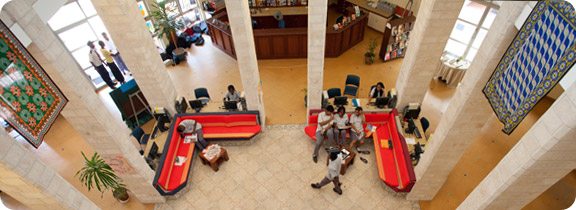
Fees
The fees indicated below are in MZN
|
Tuition Fees |
Annual Tuition Fees | Tri-payment plan* |
| Nursery Grade 1 | ||
| Nursery Grade 2 | ||
| Junior Grade 1 (PYP) | ||
| Junior Grade 2 (PYP) | ||
| Junior Grade 3 - 6 (PYP) | ||
| Sibling discount (on lowest fee) | 5% | |
| Early payment discount | 3% | |
| Late fee penalty | ||
Bus Fees |
||
|
|
||
| Grade 1 – 6 | ||
Assessment Fees |
||
Other Fees/Charges |
||
| Lunch Coupon | ||
| Fieldtrips | Actual | |
Please note: If a student wishes to withdraw from the school, please refer to school fee policy.
